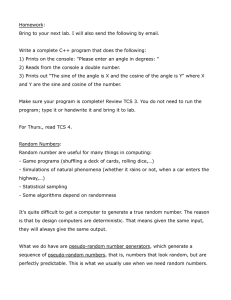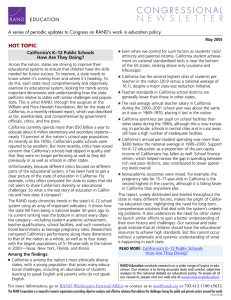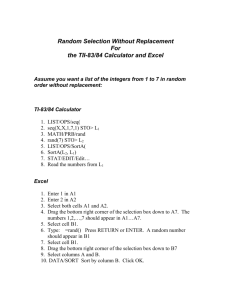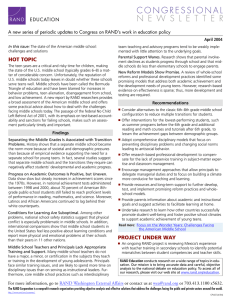HOT TOPIC
advertisement
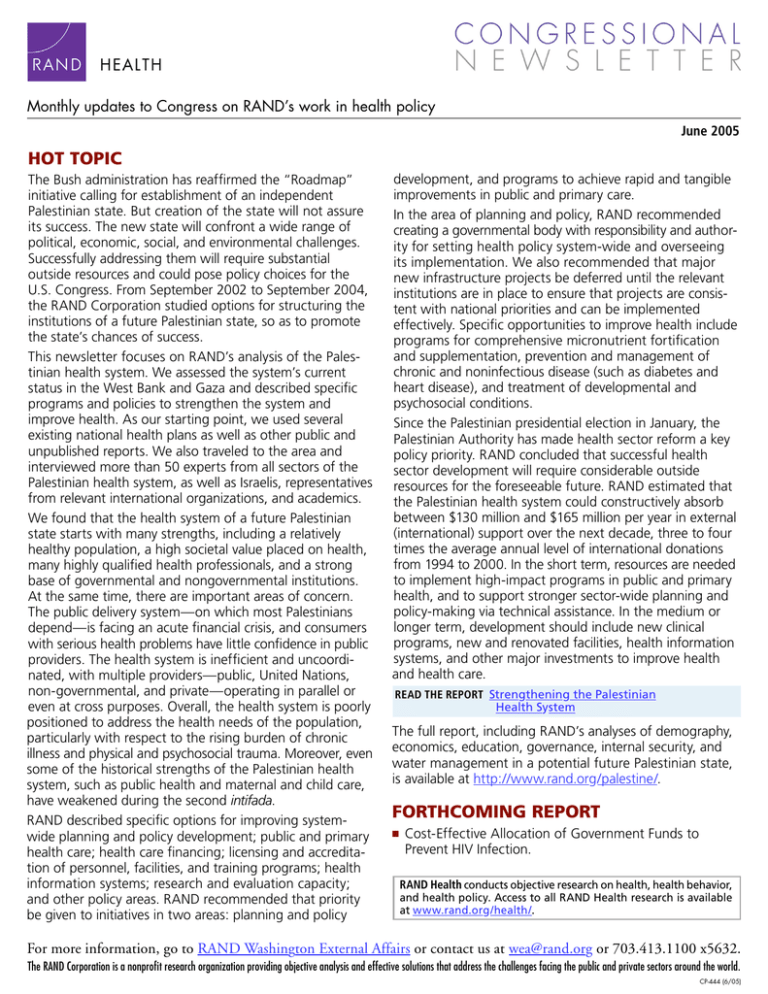
Monthly updates to Congress on RAND’s work in health policy June 2005 HOT TOPIC The Bush administration has reaffirmed the “Roadmap” initiative calling for establishment of an independent Palestinian state. But creation of the state will not assure its success. The new state will confront a wide range of political, economic, social, and environmental challenges. Successfully addressing them will require substantial outside resources and could pose policy choices for the U.S. Congress. From September 2002 to September 2004, the RAND Corporation studied options for structuring the institutions of a future Palestinian state, so as to promote the state’s chances of success. This newsletter focuses on RAND’s analysis of the Palestinian health system. We assessed the system’s current status in the West Bank and Gaza and described specific programs and policies to strengthen the system and improve health. As our starting point, we used several existing national health plans as well as other public and unpublished reports. We also traveled to the area and interviewed more than 50 experts from all sectors of the Palestinian health system, as well as Israelis, representatives from relevant international organizations, and academics. We found that the health system of a future Palestinian state starts with many strengths, including a relatively healthy population, a high societal value placed on health, many highly qualified health professionals, and a strong base of governmental and nongovernmental institutions. At the same time, there are important areas of concern. The public delivery system—on which most Palestinians depend—is facing an acute financial crisis, and consumers with serious health problems have little confidence in public providers. The health system is inefficient and uncoordinated, with multiple providers—public, United Nations, non-governmental, and private—operating in parallel or even at cross purposes. Overall, the health system is poorly positioned to address the health needs of the population, particularly with respect to the rising burden of chronic illness and physical and psychosocial trauma. Moreover, even some of the historical strengths of the Palestinian health system, such as public health and maternal and child care, have weakened during the second intifada. RAND described specific options for improving systemwide planning and policy development; public and primary health care; health care financing; licensing and accreditation of personnel, facilities, and training programs; health information systems; research and evaluation capacity; and other policy areas. RAND recommended that priority be given to initiatives in two areas: planning and policy development, and programs to achieve rapid and tangible improvements in public and primary care. In the area of planning and policy, RAND recommended creating a governmental body with responsibility and authority for setting health policy system-wide and overseeing its implementation. We also recommended that major new infrastructure projects be deferred until the relevant institutions are in place to ensure that projects are consistent with national priorities and can be implemented effectively. Specific opportunities to improve health include programs for comprehensive micronutrient fortification and supplementation, prevention and management of chronic and noninfectious disease (such as diabetes and heart disease), and treatment of developmental and psychosocial conditions. Since the Palestinian presidential election in January, the Palestinian Authority has made health sector reform a key policy priority. RAND concluded that successful health sector development will require considerable outside resources for the foreseeable future. RAND estimated that the Palestinian health system could constructively absorb between $130 million and $165 million per year in external (international) support over the next decade, three to four times the average annual level of international donations from 1994 to 2000. In the short term, resources are needed to implement high-impact programs in public and primary health, and to support stronger sector-wide planning and policy-making via technical assistance. In the medium or longer term, development should include new clinical programs, new and renovated facilities, health information systems, and other major investments to improve health and health care. READ THE REPORT Strengthening the Palestinian Health System The full report, including RAND’s analyses of demography, economics, education, governance, internal security, and water management in a potential future Palestinian state, is available at http://www.rand.org/palestine/. FORTHCOMING REPORT ■ Cost-Effective Allocation of Government Funds to Prevent HIV Infection. RAND Health conducts objective research on health, health behavior, and health policy. Access to all RAND Health research is available at www.rand.org/health/. For more information, go to RAND Washington External Affairs or contact us at wea@rand.org or 703.413.1100 x5632. The RAND Corporation is a nonprofit research organization providing objective analysis and effective solutions that address the challenges facing the public and private sectors around the world. CP-444 (6/05)


